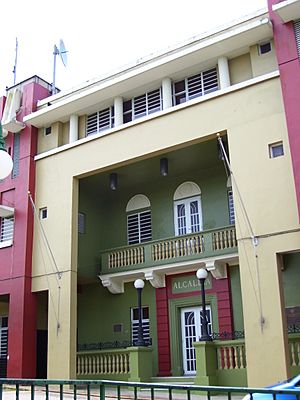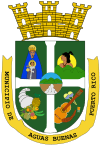Aguas Buenas, Puerto Rico facts for kids
Quick facts for kids
Aguas Buenas
Municipio Autónomo de Aguas Buenas
|
|||
|---|---|---|---|
|
Town and Municipality
|
|||

Town Hall of Aguas Buenas
|
|||
|
|||
| Nicknames:
La Ciudad de las Aguas Claras,
Los Mulos, El Oasis de Puerto Rico, Los Ñocos |
|||
| Anthem: "Yo Soy Aguas Buenas" | |||

Map of Puerto Rico highlighting Aguas Buenas Municipality
|
|||
| Sovereign state | |||
| Commonwealth | |||
| Settled | 1798 | ||
| Founded | May 25, 1838 | ||
| Barrios | |||
| Area | |||
| • Total | 30.12 sq mi (78.01 km2) | ||
| • Land | 30.12 sq mi (78.00 km2) | ||
| • Water | 0.004 sq mi (.01 km2) | ||
| Population
(2020)
|
|||
| • Total | 24,223 | ||
| • Rank | 49th in Puerto Rico | ||
| • Density | 804.22/sq mi (310.511/km2) | ||
| Demonym(s) | Aguasbonenses | ||
| Time zone | UTC−4 (AST) | ||
| ZIP Code |
00703
|
||
| Area code(s) | 787/939 | ||
| Major routes | |||
| Website | http://legislaturaaguasbuenas.com/ | ||
Aguas Buenas is a town and municipality in Puerto Rico. It is located in the Central Mountain Range. The town is north of Cidra and east of Comerio. It is also south of Bayamón, Guaynabo, and San Juan. Aguas Buenas is part of the San Juan-Caguas-Guaynabo Metropolitan Statistical Area.
Contents
What's in a Name?
The name Aguas Buenas means "good waters" in Spanish. The town was first called Aguabuena or Aguas Claras, meaning "clear waters." These names and nicknames like "City of Clear Waters" and "Puerto Rico's Oasis" refer to the many natural water springs found there. You can find many of these springs around the Aguas Buenas Cave and Caverns System Nature Reserve. People from Aguas Buenas are sometimes called Mulos (mules) or Ñocos (amputees).
History of Aguas Buenas
Aguas Buenas started as a part of Caguas called Aguabuena. In 1798, people began building homes near the rivers. They called the area Aguas Claras.
More and more people moved there. On July 25, 1832, residents decided to form their own municipality. Julian López offered his land for a town square, a church, and other important buildings.
The town officially began on May 25, 1838. Its name was changed to Aguas Buenas. Francisco de Salas Torres became the first mayor. At first, the town's economy relied on coffee farms and trade. By the late 1800s, almost 7,000 people lived there.
In 1906, Mayor Don José E. Morales bought more land. This helped the town grow bigger.
In 2010, an earthquake, known as the Nochebuena Earthquake, happened near Aguas Buenas.
In 2017, Hurricane Maria caused many landslides in Aguas Buenas. The hurricane damaged many homes and the entire electrical system. Many people had to live with blue tarps as roofs for a long time.
Geography and Nature
Aguas Buenas is a mountainous area. It is located on the northern edge of the Cayey mountain range. This range is part of the Central Mountain Range in Puerto Rico. Some of the highest points are La Peña, Santa Bárbara, La Tisa, and La Marquesa.
Rivers and Waterways
Several rivers flow through Aguas Buenas. These include the Bayamón River. There are also smaller rivers that feed into the Río Grande de Loíza, such as Bairoa, Caguitas, and Cañas.
Barrios: Town Divisions
Like all municipalities in Puerto Rico, Aguas Buenas is divided into areas called barrios. The main town area, with its buildings and church, is called "el pueblo".
Here are the barrios in Aguas Buenas:
- Aguas Buenas barrio-pueblo
- Bairoa
- Bayamoncito
- Cagüitas
- Jagüeyes
- Juan Asencio
- Mula
- Mulita
- Sonadora
- Sumidero
Sectors: Smaller Areas
Barrios are further divided into smaller areas called sectores (sectors). These can have different names like urbanización or barriada.
Special Communities
Some areas are called Comunidades Especiales de Puerto Rico (Special Communities of Puerto Rico). These are communities that receive special support. In Aguas Buenas, some of these include Vázquez neighborhood, Las Parcelas in Bayamoncito barrio, and Sonadora barrio.
Fun Things to Do
Aguas Buenas has several interesting places to visit. Many are located around the town square.
Places to Visit
- Finca Artesanal
- La Charca Recreational Center
- Aguas Buenas Caves
- El Mirador Walkway
- Luis A. Ferré Plaza (the main town square)
- City Hall
- Holy Spirit parish
To encourage tourism, the Puerto Rico Tourism Company started the Voy Turistiendo campaign. It highlights places like Viva La Cosecha (a farm tourism spot) and Hacienda Cascada (another farm tourism spot).
Culture and Events
Sports
Aguas Buenas has an amateur baseball team. They are called Los Tigres de Aguas Buenas.
Festivals and Celebrations
Aguas Buenas celebrates its patron saint festival in September. This is called the Fiestas Patronales Nuestra Señora de la Monserrate. It includes parades, games, local crafts, food, and live music.
Other fun events include:
- The Salsa, Bomba & Plena Festival in late summer.
- An Agricultural festival in May.
- The Festival Folklórico de Campo y Pueblo in January.
- An annual Carnival in March.
Economy
When Aguas Buenas was first founded, its economy mainly depended on growing coffee.
Population Facts
| Historical population | |||
|---|---|---|---|
| Census | Pop. | %± | |
| 1900 | 7,977 | — | |
| 1910 | 8,292 | 3.9% | |
| 1920 | 10,741 | 29.5% | |
| 1930 | 12,885 | 20.0% | |
| 1940 | 14,671 | 13.9% | |
| 1950 | 15,565 | 6.1% | |
| 1960 | 17,034 | 9.4% | |
| 1970 | 18,600 | 9.2% | |
| 1980 | 22,429 | 20.6% | |
| 1990 | 25,424 | 13.4% | |
| 2000 | 29,032 | 14.2% | |
| 2010 | 28,659 | −1.3% | |
| 2020 | 24,223 | −15.5% | |
| U.S. Decennial Census 1899 (shown as 1900) 1910–1930 1930–1950 1960–2000 2010 2020 |
|||
In 2020, the population of Aguas Buenas was 24,223 people. This was a decrease from the 2010 census.
About 72.5% of the people identify as White. Around 12.6% identify as African-American. The population is almost evenly split between males and females. About 25% of the people are under 18 years old.
Town Symbols
Aguas Buenas has its own official flag and coat of arms.
The Flag
The flag of Aguas Buenas has a blue triangle at one end with a white star. A yellow triangle crosses it. The rest of the flag is green.
The Coat of Arms
The coat of arms was designed in 1975. It has four sections.
- The top left shows the Virgin of Monserrate.
- The top right shows a Taíno, representing the island's first people.
- The bottom right has a cornucopia filled with local fruits. This shows how important agriculture was to the town.
- The bottom left has four maracas and a güicharo. These are musical instruments typical of the "jibaros" (country folk) of Puerto Rico.
The crown on top has three towers, like those of other Puerto Rican municipalities.
The Anthem
The anthem of Aguas Buenas is called "Yo Soy Aguas Buenas." Here are the lyrics:
Bajo el azul del cielo de mi patria
En el oriente de la Cordillera
Aguasbonenses forjando la historia
Defendiendo el honor de su bandera.
De sol a sol sembrando nuestros frutos
El orgullo labrado en nuestra tierra
La siega de un futuro va anunciando
El brillo de la solitaria estrella.
Que se levanta en medio del combate
Por negarse a ser solo una quimera
Raices firmes que en el pecho laten
Afirmando la patria y la conciencia.
Aguas Buenas, estirpe de valientes
Pedazo del terruño borinqueño
Un pueblo que se une en la conquista
De lo que es ser un buen puertoriqueñio.
Yo soy Aguas Buenas!
Getting Around
To get to Aguas Buenas, you can take Puerto Rico Highway 52 to Caguas. From there, PR-156 leads right into the town square. Other roads connect to nearby towns like Comerío.
There are 13 bridges in Aguas Buenas.
Education
Aguas Buenas has about 14 public schools. The Puerto Rico Department of Education manages them.
Elementary Schools
- Dr. Gustavo Muñoz Díaz
- Ezequiel Ramos La Santa
- Jagüeyes Abajo
- José R. González
- Luis Santaella
- Luis T. Baliñas
- Mulitas Alvelo
- Ramón Luis Rivera/Juan Asencio
- Santa Clara
Junior High Schools
- Dr. Pedro Albizu Campos
- Luis Muñoz Marín
- Su Bayamoncito
- Su Sumidero
High Schools
- Josefa Pastrana
Notable People
- Victor Hernández Cruz – Poet
- Gustavo Muñoz Díaz – Dramatist
- Jacobo Córdova Chirino (1901–1955) – Journalist & Humorist
- José Arsenio Torres – Professor
- Luis Rechani Agrait (1902–1997) – Dramatist
- Pio Rechani – Journalist
- Rafael Nicolau – Journalist
- Josefa Pastrana Lopez (1899–1958) – Professor
- Joyce Giraud – Actress and Miss Puerto Rico 1998
- Ismael Cruz Córdova, actor
See also
 In Spanish: Aguas Buenas para niños
In Spanish: Aguas Buenas para niños
 | May Edward Chinn |
 | Rebecca Cole |
 | Alexa Canady |
 | Dorothy Lavinia Brown |




